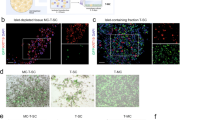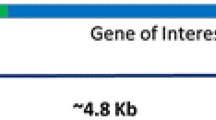Abstract
Efficient delivery of therapeutic proteins into the pancreas represents a major obstacle to gene therapy of pancreatic disorders. The current study compared the efficiency of recombinant lentivirus and adeno-associated virus (AAV) serotypes 1, 2, 5, 8 vectors delivered by intrapancreatic injection for gene transfer in vivo. Our results indicate that lentivirus and AAV 1, 2, 8 are capable of transducing pancreas with the order of efficiency AAV8 >>AAV1 > AAV2 ≥ lentivirus, whereas AAV5 was ineffective. AAV8 resulted in an efficient, persistent (150 days) and dose-dependent transduction in exocrine acinar cells and endocrine islet cells. Pancreatic ducts and blood vessels were also transduced. Extrapancreatic transduction was restricted to liver. Leukocyte infiltration was not observed in pancreas and blood glucose levels were not altered. Thus, AAV8 represents a safe and effective vehicle for therapeutic gene transfer to pancreas in vivo.
Similar content being viewed by others
References
Raper S.E., DeMatteo R.P.: Adenovirus-mediated in vivo gene transfer and expression in normal rat pancreas. Pancreas 12:401–410, 1996
Ayuso E., Chillon M., Agudo J., Haurigot V., Bosch A., Carretero A., Otaegui P.J., Bosch F.: In vivo gene transfer to pancreatic beta cells by systemic delivery of adenoviral vectors. Hum. Gene Ther. 15:805–812, 2004
Shifrin A.L., Auricchio A., Yu Q.C., Wilson, J., Raper S.E.: Adenoviral vector-mediated insulin gene transfer in the mouse pancreas corrects streptozotocin-induced hyperglycemia. Gene Ther. 8:1480–1489, 2001
Sigalla J., David A., Anegon I., Fiche M., Huvelin J.M., Boeffard F., Cassard A., Soulillou J.P., Le Mauff B.: Adenovirus-mediated gene transfer into isolated mouse adult pancreatic islets: normal beta-cell function despite induction of an anti-adenovirus immune response. Hum. Gene Ther. 8:1625–1634, 1997
McClane S.J., Chirmule N., Burke C.V., Raper S.E.: Characterization of the immune response after local delivery of recombinant adenovirus in murine pancreas and successful strategies for readministration. Hum. Gene Ther. 8:2207–2216, 1997
Castaing M., Guerci A., Mallet J., Czernichow P., Ravassard P., Scharfmann R.: Efficient restricted gene expression in beta cells by lentivirus-mediated gene transfer into pancreatic stem/progenitor cells. Diabetologia 48:709–719, 2005
Kobinger G.P., Deng S., Louboutin J.P., Vatamaniuk M., Matschinsky F., Markmann J.F., Raper S.E., Wilson J.M.: Transduction of human islets with pseudotyped lentiviral vectors. Hum. Gene Ther. 15:211–219, 2004
Giannoukakis N., Mi Z., Gambotto A., Eramo A., Ricordi C., Trucco M., Robbins P.: Infection of intact human islets by a lentiviral vector. Gene Ther. 6:1545–1551, 1999
Gallichan W.S., Kafri T., Krahl T., Verma I.M., Sarvetnick N.: Lentivirus-mediated transduction of islet grafts with interleukin 4 results in sustained gene expression and protection from insulitis. Hum. Gene Ther. 9:2717–2726: 1998
Carter P.J., Samulski R.J.: Adeno-associated viral vectors as gene delivery vehicles. Int. J. Mol. Med. 6:17–27, 2000
Grimm D., Kay M.A.; From virus evolution to vector revolution: use of naturally occurring serotypes of adeno-associated virus (AAV) as novel vectors for human gene therapy. Curr. Gene Ther. 3: 281–304, 2003
Flannery J.G., Zolotukhin S., Vaquero M.I., LaVail M.M., Muzyczka N., Hauswirth W.W.; Efficient photoreceptor-targeted gene expression in vivo by recombinant adeno-associated virus. Proc. Natl. Acad. Sci. USA 94: 6916–6921, 1997
Song S., Morgan M., Ellis T., Poirier A., Chesnut K., Wang J., Brantly M., Muzyczka N., Byrne B.J., Atkinson M., Flotte T.R.; Sustained secretion of human alpha-1-antitrypsin from murine muscle transduced with adeno-associated virus vectors. Proc. Natl. Acad. Sci. USA 95: 14384–14388, 1998
Zhang Y.C., Pileggi A., Agarwal A., Molano R.D., Powers M., Brusko T., Wasserfall C., Goudy K., Zahr E., Poggioli R., Scott-Jorgensen M., Campbell-Thompson M., Crawford J.M., Nick H., Flotte T., Ellis T.M., Ricordi C., Inverardi L., Atkinson M.A.; Adeno-associated virus-mediated IL-10 gene therapy inhibits diabetes recurrence in syngeneic islet cell transplantation of NOD mice. Diabetes 52: 708–716, 2003
Flotte T., Agarwal A., Wang J., Song S., Fenjves E.S., Inverardi L., Chesnut K., Afione S., Loiler S., Wasserfall C., Kapturczak M., Ellis T., Nick H., Atkinson M.: Efficient ex vivo transduction of pancreatic islet cells with recombinant adeno-associated virus vectors. Diabetes 50: 515–520, 2001
Kapturczak M., Zolotukhin S., Cross J., Pileggi A., Molano R.D., Jorgensen M., Byrne B., Flotte T.R., Ellis T., Inverardi L., Ricordi C., Nick H., Atkinson M., Agarwal A., Transduction of human and mouse pancreatic islet cells using a bicistronic recombinant adeno-associated viral vector. Mol. Ther. 5:154–160, 2002
Loiler S.A., Conlon T.J., Song S., Tang Q., Warrington K.H., Agarwal A., Kapturczak M., Li C., Ricordi C., Atkinson M.A., Muzyczka N., Flotte T.R.: Targeting recombinant adeno-associated virus vectors to enhance gene transfer to pancreatic islets and liver. Gene Ther. 10: 1551–1558, 2003
Rehman K.K., Wang Z., Bottino R., Balamurugan A.N., Trucco M., Li J., Xiao X., Robbins P.D.: Efficient gene delivery to human and rodent islets with double-stranded (ds) AAV-based vectors. Gene Ther. 12:1313–1323, 2005
Wang A.Y., Peng P.D., Ehrhardt A., Storm T.A., Kay M.A.: Comparison of adenoviral and adeno-associated viral vectors for pancreatic gene delivery in vivo. Hum. Gene Ther. 15:405–413, 2004
Loiler S.A., Tang Q., Clarke T., Campbell-Thompson M.L., Chiodo V., Hauswirth W., Cruz P., Perret-Gentil M., Atkinson M.A., Ramiya V.K., Flotte T.R.: Localized gene expression following administration of adeno-associated viral vectors via pancreatic ducts. Mol. Ther. 12:519–527, 2005
Wang Z., Zhu T., Rehman K.K., Bertera S., Zhang J., Chen C., Papworth G., Watkins S., Trucco M., Robbins P.D., Li J., Xiao X.: Widespread and stable pancreatic gene transfer by adeno-associated virus vectors via different routes. Diabetes 55:875–884, 2006
Chang L.J., Zaiss A.K.: Lentiviral vectors. Prepartion and use. Method. Mol. Med. 69:303–318, 2002
Chen X.G., Zhu H.Z., Gong J.L., Li F., Xue J.L.: Efficient delivery of human clotting factor IX after injection of lentiviral vectors in utero. Acta Pharmacol. Sin. 25:789–793, 2004
Follenzi A., Sabatino G., Lombardo A., Boccaccio C., Naldini L.: Efficient gene delivery and targeted expression to hepatocytes in vivo by improved lentiviral vectors. Hum. Gene Ther. 13:243–260, 2002
Nakai H., Fuess S., Storm T.A., Muramatsu S., Nara Y., Kay M.A.: Unrestricted hepatocyte transduction with adeno-associated virus serotype 8 vectors in mice. J. Virol. 79:214–224, 2005
Wang Z., Zhu T., Qiao C., Zhou L., Wang B., Zhang J., Chen C., Li J., Xiao X.: Adeno-associated virus serotype 8 efficiently delivers genes to muscle and heart. Nat. Biotechnol. 23:321–328, 2005
Xiao X., Li J., Samulski R.J.: Efficient long-term gene transfer into muscle tissue of immunocompetent mice by adeno-associated virus vector. J. Virol. 70:8098–8108, 1996
Sutherland R.M., McKenzie B.S., Zhan Y., Corbett A.J., Fox-Marsh A., Georgiou H.M., Harrison L.C., Lew A.M.: Anti-CD45RB antibody deters xenograft rejection by modulating T cell priming and homing. Int. Immunol. 14:953–962, 2002
Akache B., Grimm D., Pandey K., Yant S.R., Xu H., Kay M.A.: The 37/67-kilodalton laminin receptor is a receptor for adeno-associated virus serotypes 8, 2, 3, and 9. J. Virol. 80:9831–9836, 2006
Thomas C.E., Storm T.A., Huang Z., Kay M.A.: Rapid uncoating of vector genomes is the key to efficient liver transduction with pseudotyped adeno-associated virus vectors. J. Virol. 78:3110–3122, 2004
Kaplitt M.G., Leone P., Samulski R.J., Xiao X., Pfaff D.W. O’Malley KL, During M.J.: Long-term gene expression and phenotypic correction using adeno-associated virus vectors in the mammalian brain. Nat. Genet. 8:148–154, 1994
Snyder R.O., Miao C., Meuse L., Tubb J., Donahue B.A., Lin H.F., Stafford D.W., Patel S., Thompson A.R., Nichols T., Read M.S., Bellinger D.A., Brinkhous K.M., Kay M.A.: Correction of hemophilia B in canine and murine models using recombinant adeno-associated viral vectors. Nat. Med. 5:64–70, 1999
Mingozzi F., Schuttrumpf J., Arruda V.R., Liu Y., Liu Y.L. High K.A., Xiao W., Herzog R.W.: Improved hepatic gene transfer by using an adeno-associated virus serotype 5 vector. J. Virol. 76:10497–10502, 2002
Davidson B.L., Stein C.S., Heth J.A., Martins I., Kotin R.M., Derksen T.A., Zabner J., Ghodsi A., Chiorini J.A.: Recombinant adeno-associated virus type 2, 4, and 5 vectors: transduction of variant cell types and regions in the mammalian central nervous system. Proc. Natl. Acad. Sci. USA 97:3428–3432, 2000
Zabner J., Seiler M., Walters R., Kotin R.M., Fulgeras W., Davidson B.L., Chiorini J.A.: Adeno-associated virus type 5 (AAV5) but not AAV2 binds to the apical surfaces of airway epithelia and facilitates gene transfer. J. Virol. 74:3852–3858, 2000
Higashikawa F., Chang L.: Kinetic analyses of stability of simple and complex retroviral vectors. Virology 280:124–131, 2001
Chirmule N., Propert K., Magosin S., Qian Y., Qian R., Wilson J.: Immune responses to adenovirus and adeno-associated virus in humans. Gene Ther. 6:1574–1583, 1999
Zhang Y.C., Powers M., Wasserfall C., Brusko T., Song S., Flotte T., Snyder R.O., Potter M., Scott-Jorgensen M., Campbell-Thompson M., Crawford J.M., Nick H.S., Agarwal A., Ellis T.M., Atkinson M.A.: Immunity to adeno-associated virus serotype 2 delivered transgenes imparted by genetic predisposition to autoimmunity. Gene Ther. 11:233–240, 2004
Gao G.P., Alvira M.R., Wang L., Calcedo R., Johnston J., Wilson J.M.: Novel adeno-associated viruses from rhesus monkeys as vectors for human gene therapy. Proc. Natl. Acad. Sci. USA 99:11854–11859, 2002
Wang L., Calcedo R., Nichols T.C., Bellinger D.A., Dillow A., Verma I.M., Wilson J.M.: Sustained correction of disease in naive and AAV2-pretreated hemophilia B dogs: AAV2/8-mediated, liver-directed gene therapy. Blood 105:3079–3086, 2005
Acknowledgements
This work is in part supported by the American Heart Association grant ( 0435243N, National Institute of Health grant R01 HL067248, and a private donation from John Horst, Tampa, Florida.
Author information
Authors and Affiliations
Corresponding author
Rights and permissions
About this article
Cite this article
Cheng, H., Wolfe, S.H., Valencia, V. et al. Efficient and persistent transduction of exocrine and endocrine pancreas by adeno-associated virus type 8. J Biomed Sci 14, 585–594 (2007). https://doi.org/10.1007/s11373-007-9159-1
Received:
Accepted:
Published:
Issue Date:
DOI: https://doi.org/10.1007/s11373-007-9159-1




